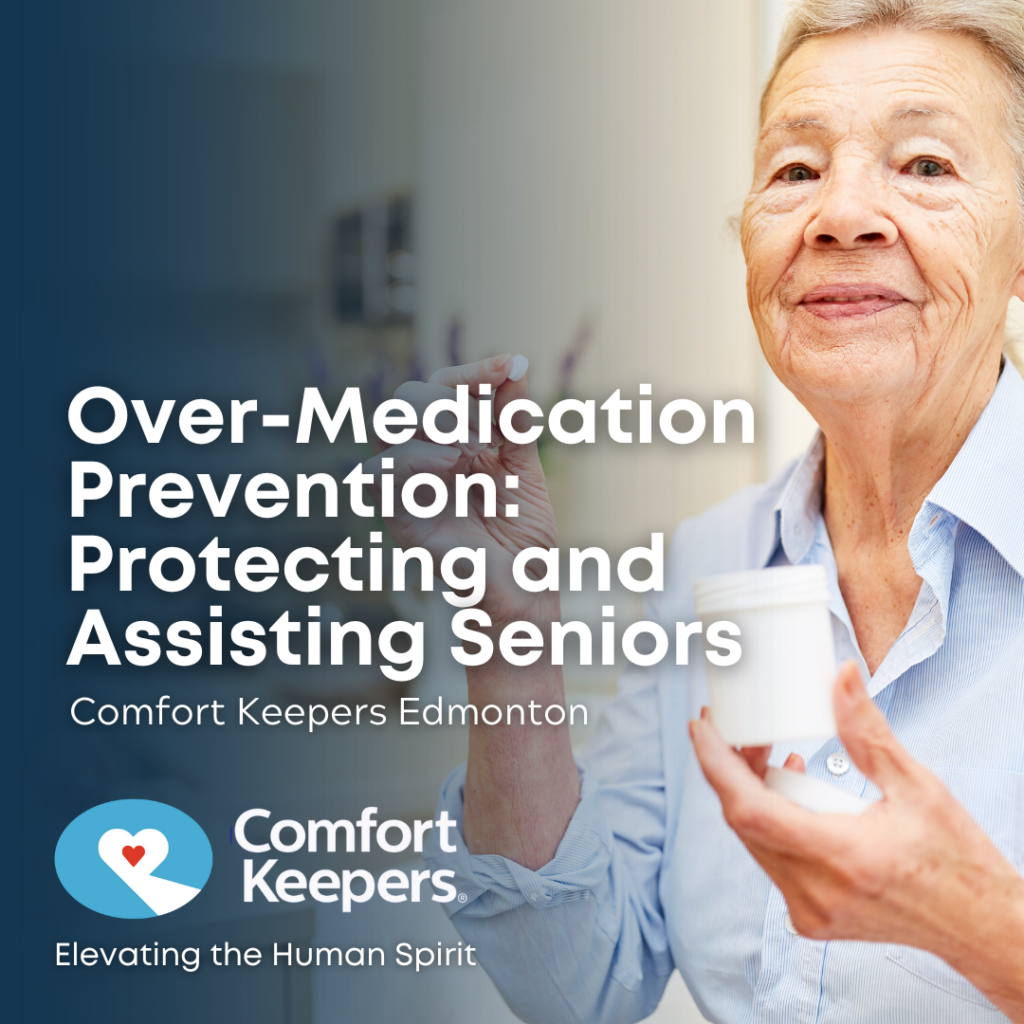Over-Medication Prevention: Protecting and Assisting Seniors
Senior Medication Management | January 10, 2024

What Every Senior in Edmonton, AB, Needs to Know About Preventing Over-Medication
Over-Medication Prevention | For certain individuals, medication is crucial for maintaining their well-being and cannot be avoided. However, several prescribed drugs taken simultaneously can result in higher occurrences of harmful interactions and dangerous side effects.
#DYK – 30 – 40% of people age 65 and over take 5 or more medications regularly. Of that group, about 10 percent of them take 10 or more drugs.
Excessive use of medication and taking multiple prescriptions (referred to as polypharmacy) are prevalent and on the rise among older individuals.
As seniors tend to have more long-term health issues that necessitate medication, it is important to note that their aging bodies may respond differently to drugs and may process them at a slower rate, placing a higher emphasis on the potential risks of drug interactions.
Contributing Factors to Senior Over-Medication
The increase in polypharmacy in the past decade is primarily due to the availability of a greater variety of drugs for chronic conditions such as high blood pressure, cholesterol, osteoarthritis, and osteoporosis.
Improved diagnoses have also contributed to the rise in medication usage. Moreover, the marketing of drugs directly to consumers has led to patients requesting and using medications they have seen advertised on television or in magazines.
Insurers, doctors, and pharmacies often fail to coordinate with each other, and the responsibility falls on the patient to manage multiple prescriptions from different prescribers. This can be something that some seniors struggle with.
#FastFact – Recent statistics reveal that 1 in every 4 patients have prescriptions from at least 4 doctors.
Seniors with slightly elevated cholesterol, blood pressure, and blood sugar may be able to reduce their medication intake if they make necessary lifestyle changes to manage their conditions.
However, individuals who use chronic disease medications for extended periods, or even indefinitely, may not be able to improve with mere lifestyle changes alone.
Additionally, numerous studies indicate that a considerable number of individuals are being prescribed antidepressants, anti-anxiety medication, and pain relievers unnecessarily.
Potential Dangers of Senior Over-Medication
While drugs do save lives, few prescription medications are completely free of risks or side effects. A 2012 report by Bruyere, a Canadian health services organization, listed several factors that put seniors at increased risk from polypharmacy:
- Physiologic changes (increased sensitivity to benzodiazepines, analgesics, or antihypertensives)
- Reduced kidney and liver function (making it harder to excrete drugs)
- Reduced body fat (this changes the distribution of drugs)
- Existing conditions (dementia, delirium, poor kidney function, poor balance, and increased likelihood of falls)
The mental faculties and cognition of seniors can be impacted by polypharmacy. This can lead to misdiagnoses of depression, dementia, and Alzheimer’s disease in overmedicated seniors.
Recognize the Warning Signs of Senior Over-Medication
Recognizing the signs of senior over-medication can seniors who are overmedicated. These indicators may include fatigue, physical issues such as dry mouth or sores, mental confusion, social withdrawal, visual or auditory illusions, loss of balance, frequent falls, broken bones, and seizures. If any of these red flags appear or there are abrupt shifts in behaviour, it is important to seek a physician to assess the situation.
How to Cut Down on Senior Prescriptions:
- If your loved one is on multiple medications, including vitamins, herbs, and over-the-counter (OTC) medicines, have them reassessed by their primary care doctor annually. PROtip: Remember to bring all pill bottles with you to the appointment.
- Take an active approach when discussing medication with the doctor. Inquire about the necessity of each drug and the reasoning behind it for your loved one. Additionally, seniors can inquire about the possibility of reducing their dosages.
- Consult the doctor about potential lifestyle adjustments that may reduce your loved one’s need for certain medications. Explore alternative therapies like acupuncture, yoga, or meditation as options.
- Don’t just rely on the doctor to know details about drug-drug interactions. Do online research. Reliable websites such as The DIR (Drug Information Resources) https://www.dal.ca/diff/druginfo.html and medscape.com list potential interactions and provide explanations.
- If a new medication is added to an existing regimen of two or more drugs, and there are unfamiliar side effects, it is important to inform the doctor. This is especially crucial if symptoms such as stomach discomfort, nausea, lightheadedness, drowsiness, or impaired coordination arise.
- As time passes, medication may produce a novel side effect or interaction with other drugs due to the buildup of potency. Conversely, some drugs may lose efficacy over time, potentially causing previously treated symptoms to reappear.
- Stick with one pharmacy and pharmacist and ensure they are informed about all medications, including herbs prescribed by other medical professionals. Pharmacists are often more knowledgeable about potential drug interactions compared to doctors.
Comfort Keepers® Edmonton is Proud to Offer a Wide Range of Home Senior Care Services
Our trained caregivers will ensure your loved one is comfortable, independent and safe in their home. On top of that, we will also aim to enhance their overall health, quality of life and general happiness.
Top-Notch Home Healthcare for Seniors in Edmonton, Alberta
Comfort Keepers of Edmonton offers a wider range of senior care services. We offer retirement care, respite care, senior care, companionship care, end-of-life care, post-surgery care, palliative care, personal care, and senior living transition services. If you are concerned about the health and well-being of your aging loved ones we can help with 24-hour care and more!
Helping Seniors Age-in-Place with Companionship Care and Interactive Caregiving™
Empathetic care starts in the heart and allows us to meet our client’s needs. Our trained caregivers are selected with one specific quality in mind, empathy. We strive to stimulate our clients emotionally, mentally and socially, thus enhancing their overall quality of life.
Our Interactive Caregiving™ provides a system of care that addresses companionship, safety, nutrition, mind, body, and activities of daily living (ADLs). The system increases seniors’ sense of well-being, independence and companionship by focusing on Senior Mind, Senior Body, Senior Nutrition, and Senior Safety.
Affordable and Client-Directed Homecare is Available for Qualifying Albertans
Comfort Keepers® Edmonton is an Approved Service Provider for the Client Directed Homecare Invoicing (CDHCI) Program Offered by Alberta Health Services.
What is the Client Directed Home Care Invoicing Program (CDHCI)?
CDHCI is a great program provided by Alberta Health Services (AHS), allowing clients to choose an approved agency like, Comfort Keepers Edmonton for Personal Care, Respite Care and Homemaking needs. The chosen agency can then bill AHS directly for services rendered for approved hours through Alberta Blue Cross. Read more about the program HERE.
Accredited Home Care Edmonton
Comfort Keepers® Edmonton was awarded the “Accredited with Exemplary Standing” seal by Accreditation Canada. This honour demonstrates Comfort Keepers’ commitment to offering safe, high-quality home care to its senior clients in Edmonton, AB.
To learn more about senior in-home care in Edmonton, contact the Comfort Keepers® office. Our service territory includes Edmonton, Devon, Sherwood Park, Stony Plain and surrounding areas, contact the Comfort Keepers Edmonton office at 780-465-4665.
References:
- ParentGiving. “Overmedication in the Elderly.” Web. 2016.
- MedShadow. “Are Seniors Being Overmedicated?” by Steven Findlay. Web. 2015. Updated 2016.
- AARP. “The Pharmacist Who Says No to Drugs.” by Bill Hogan. Web. 2011.
- CareConversations. “Overmedication: Warning Signs to Watch For.” Web. 2016.
Individualized Home Care Options
Long-Term Home Care, 24 Hour Home Care & Short Term Care Options Customized for You







